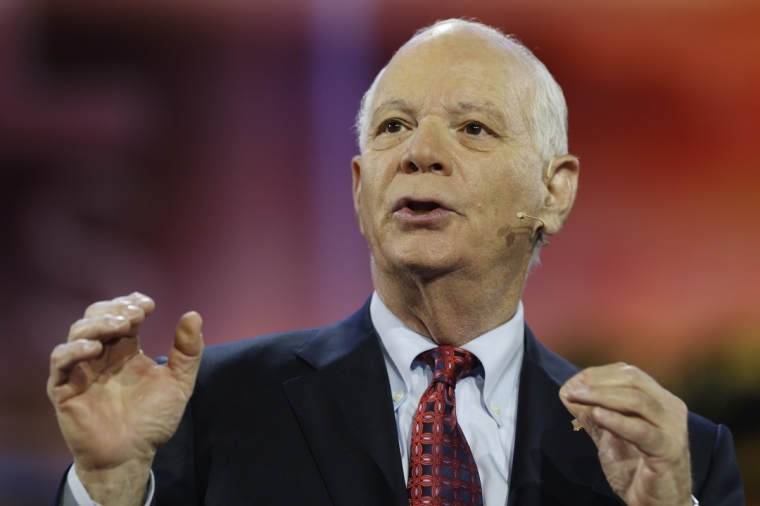Conservative: Religion the new 'Don't Ask, Don't Tell'

NEW YORK (Christian Examiner) – Homosexuality is "out of the closet," but conservative columnist Ed Morrissey writes in a new editorial that religion has been shoved in.
Morrissey, host of his own show at Hot Air, said in the commentary that "secular heretics" – bakers, florists and photographers who refused to provide services for same-sex weddings – were already being attacked by the gay rights lobby and government agencies hostile to conservative religious values.
Now, he says, "the ruling elite are already moving to the next phase of this attack on faith." Morrissey cites the words of liberal Democrat (and lesbian) Wisconsin Sen. Tammy Baldwin, who claimed protections for religious speech and practice do not extend beyond the walls of the church.
Christian Examiner reported Baldwin's comments July 1. The senator claimed there are "clear limits" to religious speech in "this new context across America" – the post Obergefell v. Hodges context.
On June 26, the Supreme Court voted 5-4 to legalize same-sex marriage nationwide in the case. Four dissenting justices – including Chief Justice John Roberts and Justices Antonin Scalia, Clarence Thomas and Samuel Alito all wrote that the decision portends dark days for religious liberty in the United States.
You have the freedom to teach, to preach the way you believe without losing your tax exempt status, the answer is yes. If you are affecting the rights of third parties, then you've crossed the line.
Morrissey argues that the senator's understanding of the First Amendment is not only erroneous; it is intentionally disingenuous and a "complete deviation from the historical application of the First Amendment."
Morrissey claims American history is full of examples of where people have contravened established law in religious protest. For instance, he cites the Quakers who were pacifists and refused to fight in the nation's wars.
"Not all Quakers refused military service, just as some Christians have no problem with serving at same-sex wedding ceremonies. The participation of some Quakers in military service did not impact the right of others to opt out of military service, even though that exemption has almost always been terribly unpopular during these conflicts. If the right of free religious expression outweighs the compelling state interest in self-defense, especially when the nation has been attacked as it was in World War II, how can anyone claim that the First Amendment can only be contained to houses of worship when it comes to a wedding?" Morrissey writes.
He also writes that a denominational connection wasn't even necessary to object conscientiously to military service and participation in war. The Supreme Court recognized this in United States v. Seeger in 1965, when it claimed any type of demonstrated religious belief about pacifism could justify an exemption from the law.
"So if anyone who has a principled stand against military force can avoid a national draft in defense of the state, why are we forcing bakers and photographers to participate in private events that violate their consistently applied values by the threat of devastating economic penalties from the government?"
Morrissey concludes liberals like Sen. Baldwin want to impose a "Don't Ask, Don't Tell" policy on religion. Under the system, he writes, "religious faith must only be practiced in private, and not lived in the world, which is exactly the opposite of the historical and precedential understanding of the First Amendment."
That type of thinking, he said, is more in line with the religious oppression and violence of the French Revolution than the established principles of religious exercise won during the American Revolution and the construction of the Constitution.
In the French context, Morrissey writes, "freedom redefined as the necessity of complete adherence to the prevailing consensus — and everyone else either shut up or lost their livelihoods or their heads."
That is only partly hyperbole. Since the decision in Obergefell, the question of tax exemption for religious organizations and schools who oppose homosexuality has been raised more than once as a first effort at moderating religious groups or shutting down those who won't cooperate. In those discussions, now heard by a much broader audience, Baldwin has softened her views some.
She told The Weekly Standard she believed religious organizations should not be taxed.
"The last thing we want is the government getting into looking at the principles of each particular faith and judging it. That is wrong and shouldn't occur," Baldwin said.
Sen. Dick Durbin [D-IL] has also weighed in on the debate. What was once a foregone conclusion – that people of faith could hold religious beliefs without interference from the government – is now not a question that cannot be given a "quick answer," he said.
He said religious schools could be forced to make to make adjustments, but he wasn't certain of his own view yet.
"There's no question this was an historic decision, and now we're going to go through a series of suggestions for new laws to implement it. I can't predict how this will end," Durbin said. "But from the beginning we have said that when it comes to marriage, religions can decide what their standards will be."
However, if Sen. Ben Cardin [D-MD] has his way, religious organizations will almost certainly lose their tax exempt status.
"You have the freedom to teach, to preach the way you believe without losing your tax exempt status, the answer is yes. If you are affecting the rights of third parties, then you've crossed the line," Cardin told The Weekly Standard.
"Employment is subject to protections," Cardin said. "I'm not sure how it applies to Christian-run schools."
Rather than fight future battles over the issue, one historically Baptist university is already making changes to its policies on homosexual relationships. Baptist Press reported that Baylor University has removed references to homosexuality in its conduct policies.